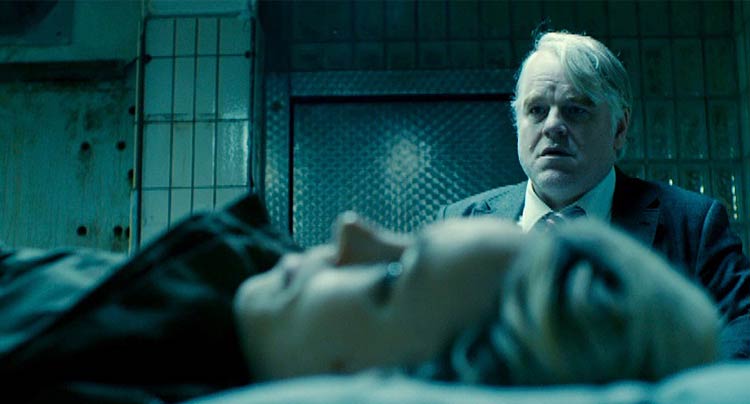
Not a story of heroes and villains, but a tightly wound game of chess, knee-deep in the murky swamps of morality’s grey areas.

Not a story of heroes and villains, but a tightly wound game of chess, knee-deep in the murky swamps of morality’s grey areas.
A grey cloud follows every film featuring Philip Seymour Hoffman ever since his untimely death earlier this year (read our Favorite Philip Seymour Hoffman moments). Posthumously released films are always tinged with darkness. So when a film like God’s Pocket comes out to disappointing reviews (read our own underwhelmed reaction) every Hoffman fan among us can’t help but feel slightly dejected. So here’s some much-needed good news; Anton Corbijn’s A Most Wanted Man, adapted from the John Le Carré novel of the same name, stars Philip Seymour Hoffman in the lead and it’s the kind of material that’s perfectly suited for the late, great actor’s talents. It may not get ahead of films like The Master, Capote, Magnolia, and Almost Famous in terms of substance; but it’s a sophisticated and shining addition to a boisterous filmography.
The plot follows Günter Bachmann (Hoffman) a government operative in command of a small anti-terrorist unit operating out of Hamburg, Germany. Title cards give us the reason behind the susceptible conditions in Hamburg; this is the port where the 9/11 attacks were planned and executed from. It’s been over a decade, and the city is still under major surveillance for any signs of terrorist activity. When a Chechen prisoner of war is picked up on a surveillance camera roaming the streets, he’s found to be Issa Karpov (Grigory Dobrygin) who will become Bachmann’s key to infiltrating a highly complicated network of Islamic terrorist cells. Other prominent players on the chessboard include Karpov’s pro bono lawyer Annabel Richter (Rachel McAdams) the head of Hamburg intelligence Dieter Mohr (Rainer Bock) Tommy Brue (Willem Dafoe) the head of a bank with old ties to Karpov’s father, and Martha (Robin Wright) a CIA agent who represents the concerns and support of the United States. As the game clock ticks louder and louder, the elaborate narrative separates the rooks from the pawns.

Thanks to his formidable cast, and an airtight screenplay by Andrew Bovell (in redemption mode from forgettable yarn Edge Of Darkness) Corbijn manages to build tension and suspense without needing to fire a single gunshot. While it doesn’t fail to hit all the familiar notes of the genre, A Most Wanted Man is engaging from start to finish, ultimately revealing the purpose of espionage in today’s highly paranoid world and the people who suffer at the hands of faceless bureaucrats operating inside air-conditioned offices. Much like the brilliant Tinker, Tailor, Soldier, Spy, another successful John Le Carré adaptation, A Most Wanted Man is a highly plot-driven film, brimming with shady characters and between-the-lines dialogue, but it’s got something extra as well. With the character of Issa Karpov, a completely disillusioned young man who ‘has no idea what he wants’ as Bachmann rightly puts it, the picture carries heavy emotional baggage not usually associated with espionage thrillers. Tinker, Tailor carried some as well but in a much more delicate and subtle fashion, which ultimately adds to the superiority it has over Corbijn’s film, but it works just as effectively here because of the story’s build-up and highly involved climax, done with expert precision.
The performances are solid across the board, but Hoffman (and I write this without an ounce of projected exaggeration) truly carries the film on the weary and grounded shoulders of Günter, a withered-down version of his Gust Avrakatos from Charlie Wilson’s War. This is a film that doesn’t pretend to shake any ground, or develop any new artistic cinematic perspectives in a genre that’s become all too familiar thanks to TV shows like Homeland and mainstream attempts at conquering the box-office with action-figure spies like Jack Ryan and Ethan Hunt. A Most Wanted Man is not a story of heroes and villains, but a tightly wound game of chess knee-deep in the murky swamps of morality’s grey areas. As such, it does an excellent job of balancing entertainment, suspense, reality, and just enough emotional investment to stop it from being corny. It solidifies Corbijn’s status as a highly efficient director (the man already has the awesome slow-burning The American under his belt) but above all else and to the delight of Hoffman fans, it’s a film worthy of the actor’s incredible career.